January 12-13, 2017
Four Seasons, Al Maryah Island, Abu Dhabi, United Arab Emirates
Thursday, January 12
OPENING REMARKS
Frederick Kempe, President and CEO, Atlantic Council
Gov. Jon M. Huntsman, Jr., Chairman, Atlantic Council
H.E. Dr. Sultan Ahmed Al Jaber, Chairman, Masdar; CEO, Abu Dhabi National Oil Company
H.E. Suhail Mohamed Faraj Al Mazrouei, Minister of Energy, United Arab Emirates
Adnan Z. Amin, Director-General, International Renewable Energy Agency
Mohamed Al Hammadi, CEO, Emirates Nuclear Energy Corporation
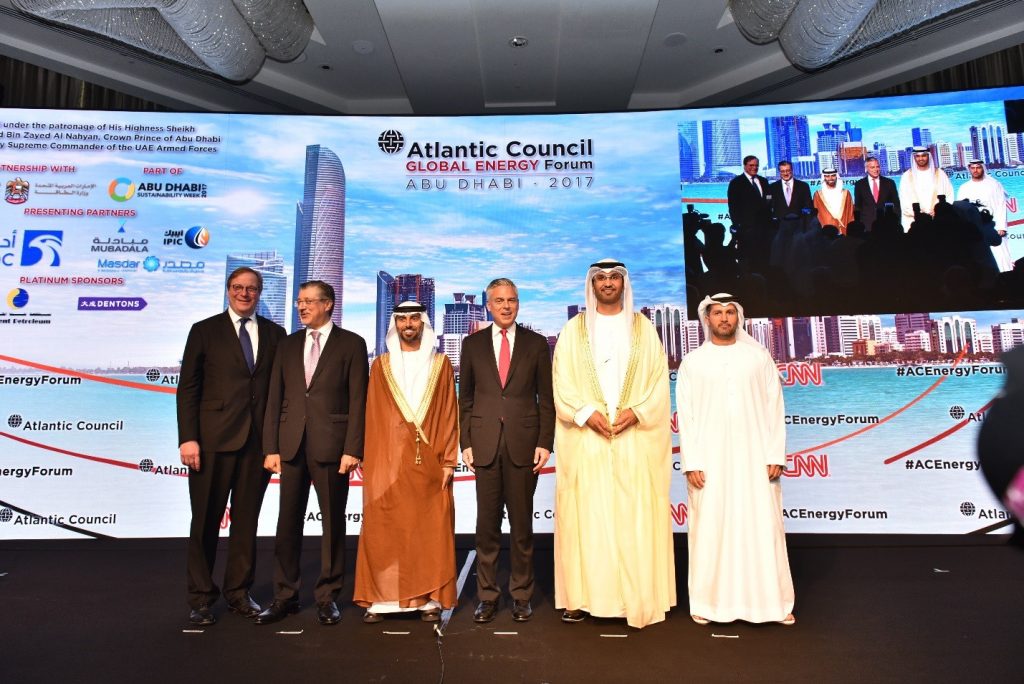
Frederick Kempe, President and CEO of the Atlantic Council, opened the Forum noting that there was no better place to launch the Global Energy Forum than in the UAE, which had used its oil resources for the benefit of its people to invest in a sustainable energy future. The geopolitics of the energy transition were key aspects to a region experiencing unrest, and to a world facing severe carbon constraints.
THE YEAR AHEAD: THE ENERGY AGENDA FOR 2017
Moderated by: John Defterios, Emerging Markets Editor, CNNMoney
H.E. Suhail Mohamed Faraj Al Mazrouei, Minister of Energy, United Arab Emirates
Patrick Pouyanné, Chairman and CEO, Total S.A.
Adnan Z. Amin, Director-General, International Renewable Energy Agency
Marwan Lahoud, EVP International, Strategy & Public Affairs, Airbus Group
Lara Sidawi Moore, Chief Strategy Officer and Chair, Executive Committee, Energy Intelligence Group
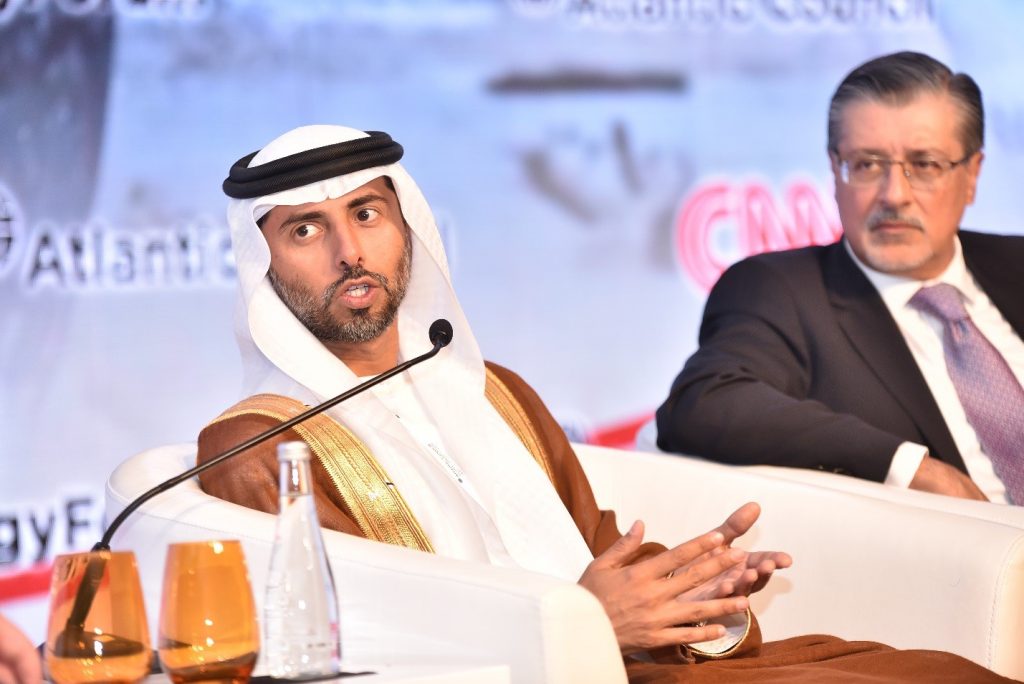
According to the panelists, the real price correction in the oil market would only emerge once groups in interested countries helped the market. Despite predictions that the market could and should balance itself in six months, surprises could ensue. On the technology front, panelists argued that companies needed to provide the world with breakthroughs to continue the trend of decarbonization.
OIL MARKET TRAJECTORIES: LONG-TERM INVESTMENT AND TECHNOLOGY RISK
Special introduction by: Majid Jafar, CEO, Crescent Petroleum; Board Managing Director, Dana Gas
Moderated by: John Defterios, Emerging Markets Editor, CNNMoney
Framing Keynote Remarks by: H.E. Jabbar al-Luaibi, Minister of Oil, Republic of Iraq
H.E. Issam A. Almarzooq, Minister of Oil;, Minister of Electricity and Water, State of Kuwait
H.E. Mohammad Sanusi Barkindo, Secretary General, Organization of the Petroleum Exporting Countries
Dr. Helima Croft, Managing Director and Global Head, Commodity Strategy, Global Research, RBC Capital Markets
Amos Hochstein, Special Envoy and Coordinator, International Energy Affairs, US Department of State
Majid Jafar noted that despite growing trends toward diversification, oil remained a vital part of the energy mix, particularly in the transportation sector. Oil prices in 2017 were twice what they were a year before, but half of what they were just few years ago. Such fluctuations were a testament to the volatility of the industry. Technological advancements would continue to take center stage, and the market would feel the impacts of the US shale boom.
WORLD ENERGY: THE ROAD TO THE FUTURE
Introduced by:
Frederick Kempe, President and CEO, Atlantic Council
Special Keynote Address By:
H.E. Khalid al-Falih, Minister of Energy, Industry, and Mineral Resources, Kingdom of Saudi Arabia
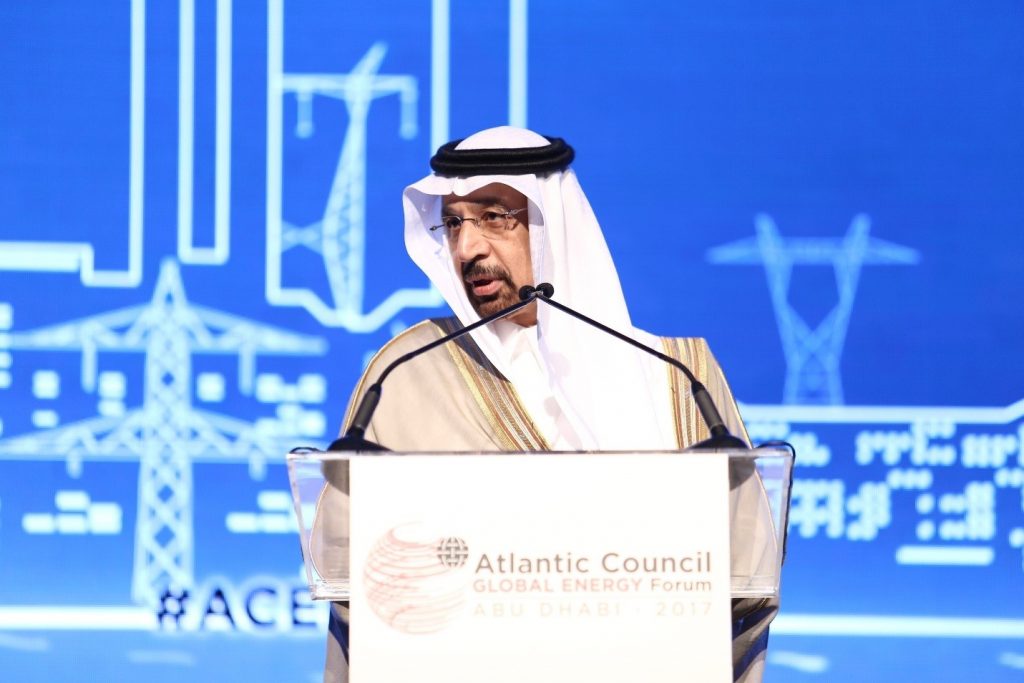
Frederick Kempe opened the address by highlighting the strong correlation between energy developments and economic and social trends. H.E. Khalid al-Falih noted several realities with which policymakers needed to grapple—particularly in the realm of growing energy demand. The reduction of emissions would continue to be a goal; however, both governments and companies needed to contribute to make ambitious reductions goals a reality.
LUNCHEON AND SPECIAL BRIEFING: A BRAVE NEW WORLD FOR RENEWABLES – SOLAR AND WIND ENERGY INVESTMENTS IN AN ERA OF PLUMMETING COSTS
Moderated by: Thomas Cunningham, Deputy Director, Global Energy Center, Atlantic Council
Bader Al Lamki, Executive Director, Masdar Clean Energy
Eng. Fatima Alfoora Alshamsi, Assistant Undersecretary for Electricity and Clean Energy Affairs, Ministry of Energy, United Arab Emirates
Shermine Dajani, Founder and CEO, PanMed Energy
Michael Eckhart, Managing Director and Global Head, Environmental Finance and Sustainability, Citigroup
Michael Taylor, Senior Analyst, Renewable Cost Status and Outlook, International Renewable Energy Agency
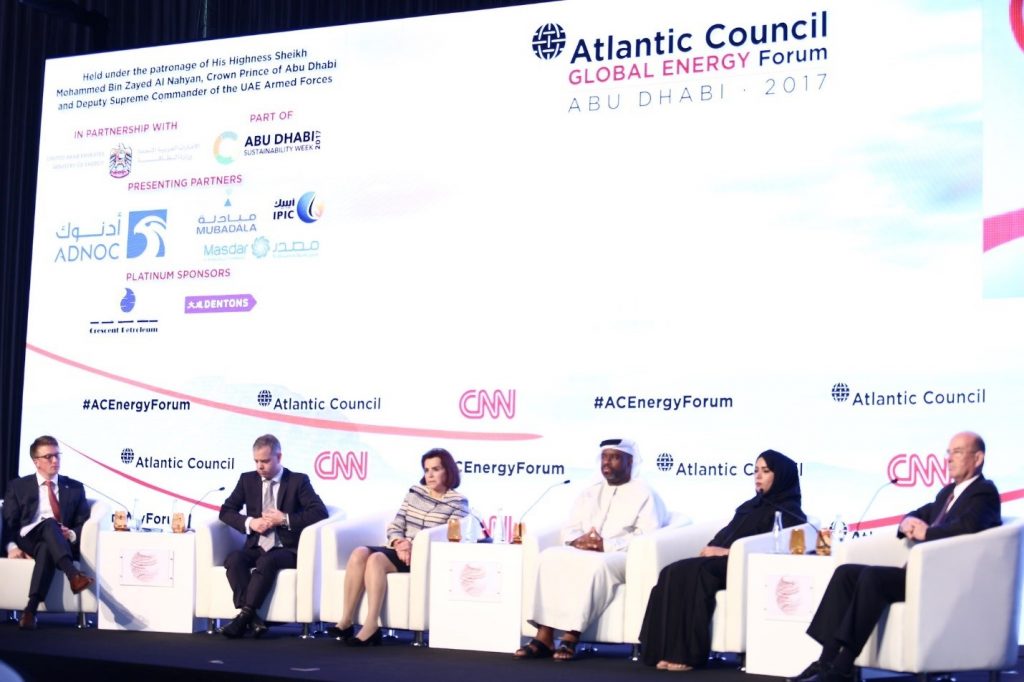
Costs for new onshore wind and solar have dropped significantly. Is this cheap renewable tipping point just hyperbole? Technological improvements have boosted capacity while also creating genuine economies of scale. Panelists argued for greater government investment in renewables but acknowledged that the public sector could not be the only driving force behind such trends. Capital markets needed to be activated as the economic outlook of renewables improved.
LEADERS COUNCIL LUNCHEON: THE ENERGY STRATEGY OF THE UAE
Special guest:
H.E. Suhail Mohamed Faraj Al Mazrouei, Minister of Energy, United Arab Emirates
[OFF-THE-RECORD]
WHATS THE CLOCK? – ECONOMIC DIVERSIFICATION STRATEGIES AND POST-OIL ERA INVESTMENT DILEMMAS
Moderated by: Becky Anderson, Managing Editor and Anchor, CNN Abu Dhabi
A conversation with: H.E. Khaldoon Khalifa Al Mubarak, Group CEO and Managing Director, Mubadala Development Company
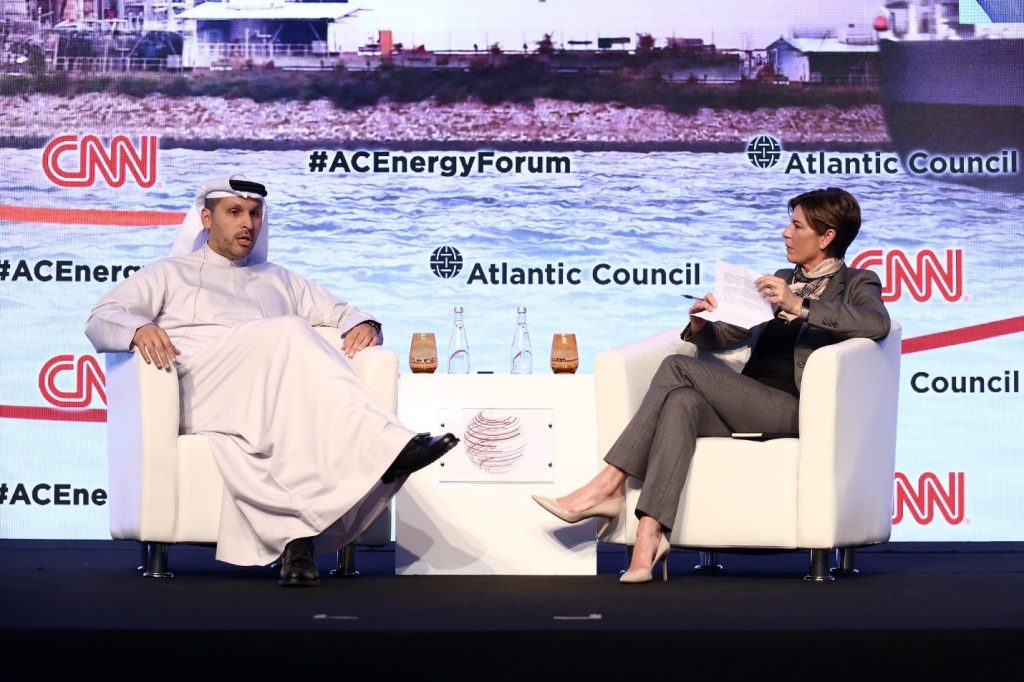
H.E. Khaldoon Khalifa Al Mubarak noted that despite positive indicators at the end of 2016, Mudabala likely faced surprises in light of upcoming elections and other geopolitical factors. He noted that Mubadala was in the final stages of its merger and would increasingly diversify its energy portfolio. Though maintenance of upstream investments remained a priority, the merger would likely pave the way for a greater focus on downstream activities.
THE GLOBAL FUTURE OF THE PEACEFUL USE OF NUCLEAR ENERGY
Moderated by: David V. Scott, Adviser to the Chairman, Executive Affairs Authority, Abu Dhabi
Keynote Speech by: Dr. Cho Hwan-Eik, President and CEO, Korea Electric Power Corp (KEPCO)
Mohamed Al Hammadi, CEO, Emirates Nuclear Energy Corporation
H.E. Jan Mládek, Minister of Industry and Trade, Czech Republic
Anne Lauvergeon, Founder, Chairman, and CEO, ALP S.A.
Daniel B. Poneman, President and CEO, Centrus Energy
Dr. Kun-mo Chung, Senior Advisor to the President and CEO, KEPCO
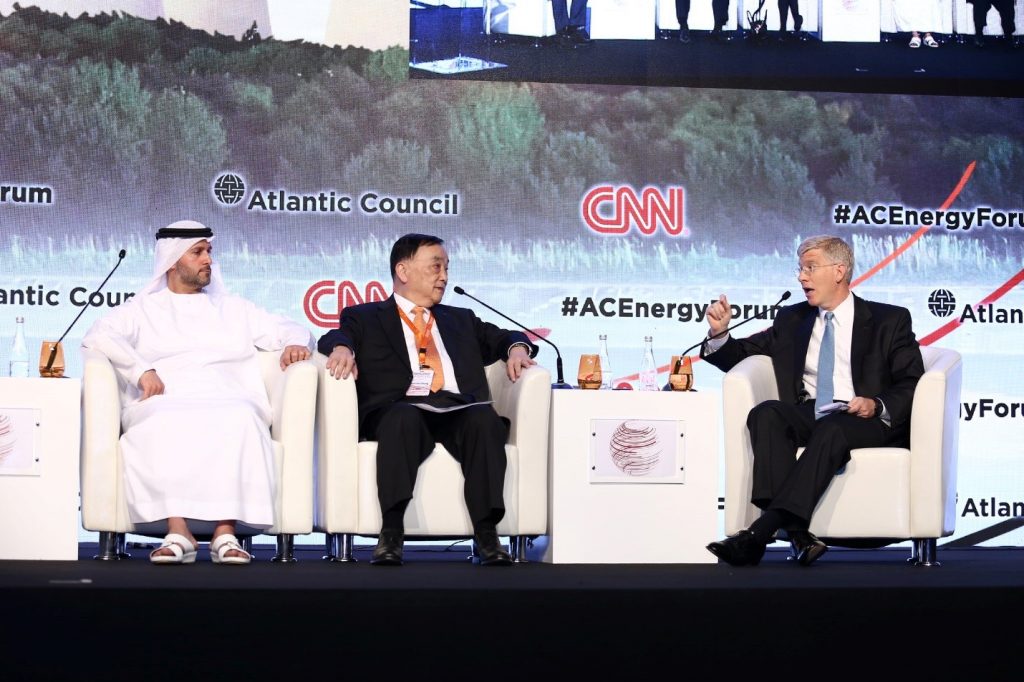
Panelists acknowledged the difficulty of speaking to the future energy mix, especially given the current energy revolution. A key focus of the discussion was the importance of safety in design, organization, and operations as future nuclear technologies underwent testing and development. Public acceptance would only come with dialogue alongside innovation in nuclear technology.
REGIONAL IMPACTS OF THE US ELECTIONS: THE MIDDLE EAST
Moderated by: Barry Pavel, Senior Vice President, Arnold Kanter Chair and Director, Brent Scowcroft Center on International Security, Atlantic Council
Neil Brown, Director, Policy and Research, KKR Global Institute
Dr. Ebtisam Al Ketbi, Chairperson, Emirates Policy Center
Brian Katulis, Senior Fellow, Center for American Progress
Damon Wilson, Executive Vice President for Programs and Strategy, Atlantic Council
[OFF-THE-RECORD]
GLOBALIZATION OF GAS MARKETS – GEOPOLITCAL CONSEQUENCES
Moderated by: Dávid Korányi, Director, Energy Diplomacy Initiative, Global Energy Center, Atlantic Council
Keynote Speech by: H.E. Noureddine Boutarfa, Minister of Energy, People’s Democratic Republic of Algeria
Majid Jafar, CEO, Crescent Petroleum; Board Managing Director, Dana Gas
Anatol Feygin, Executive Vice President and Chief Commercial Officer, Cheniere Energy
Mussabah Al-Kaabi, CEO, Mubadala Petroleum
Anne-Sophie Corbeau, Research Fellow II, King Abdullah Petroleum Studies and Research Center
Nabil Habayeb, President and CEO, GE Middle East
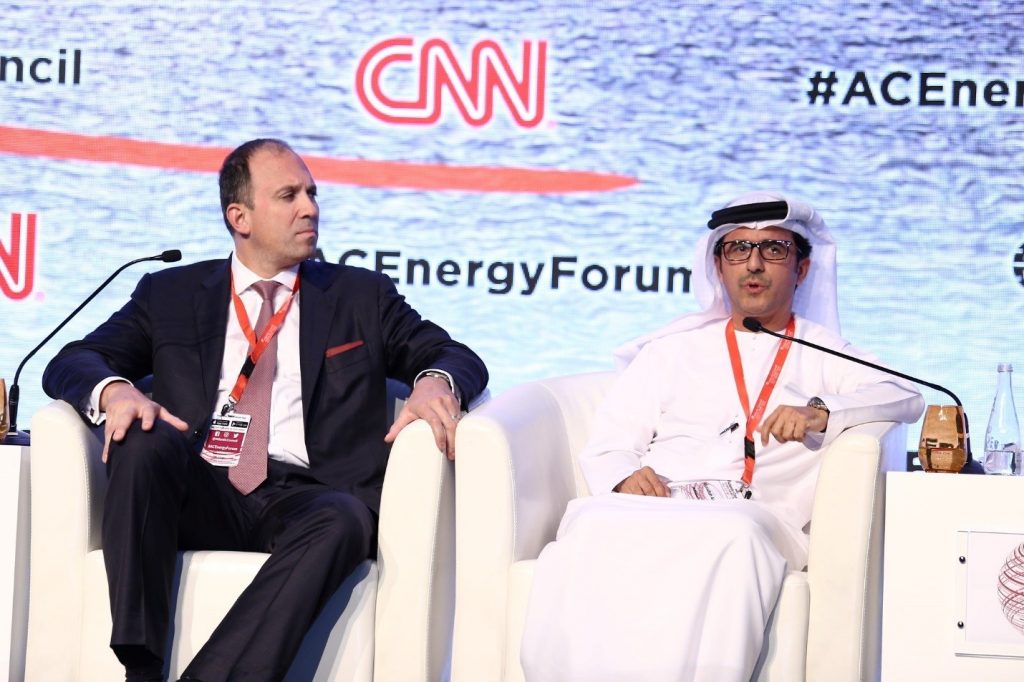
Dávid Korányi reiterated the notion that gas had the brightest future of any fossil fuel, from both environmental and business perspectives. Until recently, gas was viewed largely as an unwanted byproduct of the oil industry, but now serves as an example of the benefits revolutionary technology could bring over a short period.
CHINA’S ONE BELT ONE ROAD STRATEGY – CONTINENTAL AND OCEANIC SUPERHIGHWAYS
Introduced by: Gov. Jon M. Huntsman, Jr., Chairman, Atlantic Council
Moderated by: Lubna Bouza, Business News Anchor, Sky News Arabia
Dr. Ken Koyama, Managing Director, Chief Economist, Strategy Research Unit, The Institute of Energy Economics, Japan
Philip Lambert, Founder & CEO, Lambert Energy
Dr. Gal Luft, Co-director, Institute for the Analysis of Global Security
Dr. Lanxin Xiang, Director, Center of One Belt One Road Studies, China National Institute for SCO International Exchange and Judicial Cooperation
One Belt One Road (OBOR) is a cornerstone of China’s national revitalization and a tool for fostering connectivity and cooperation between China and Eurasia. Its primary focus is the development of underperforming regions through Chinese investment in infrastructure and industry. Despite ambitious plans, panelists warned that China’s economic slowdown, paired with its overly assertive regional policies, would pose hurdles for the project’s success.
Friday, January 13
SPECIAL BREAKFAST – SECURITY BRIEFING: GLOBAL POLITICAL AND DECURITY RISKS POST-ELECTIONS
Introduced and moderated by: Frederick Kempe, President and CEO, Atlantic Council
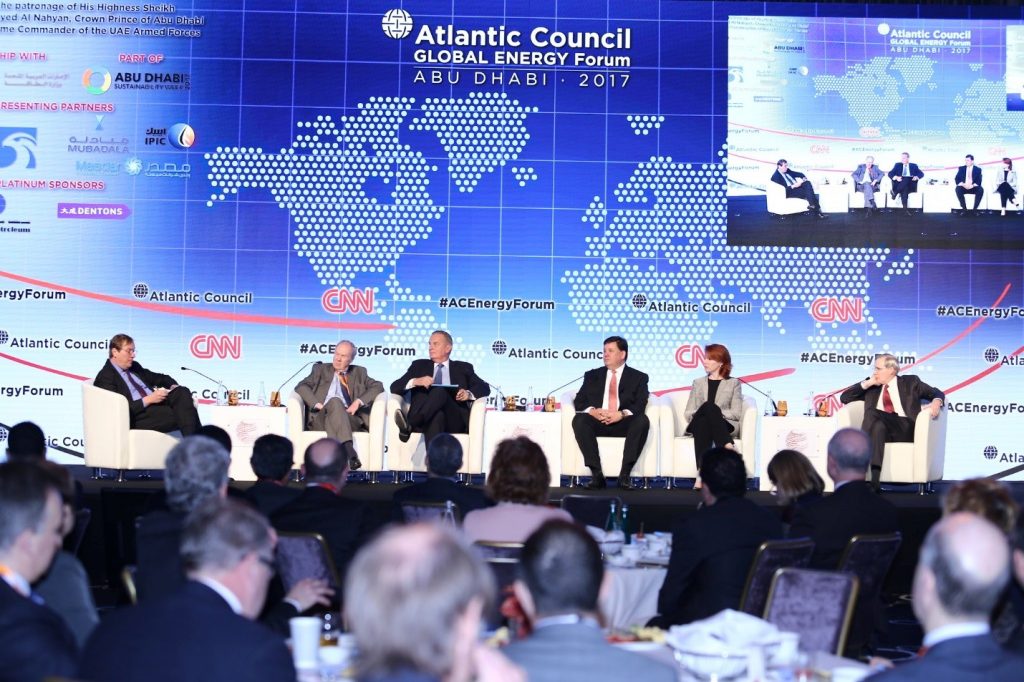
Dr. Mathew Burrows, Director, Strategic Foresight Initiative, Brent Scowcroft Center on International Security, Atlantic Council
Stephen J. Hadley, Principal, RiceHadleyGates, LLC; former US National Security Advisor to President George W. Bush
Karl V. Hopkins, Global Chief Security Officer and Partner, Dentons
GEN James L. Jones, President, Jones Group International; Chairman, Brent Scowcroft Center on International Security, Atlantic Council; former US National Security Advisor to President Barack Obama
Dr. Meghan O’Sullivan, Jeane Kirkpatrick Professor of the Practice of International Affairs and Director, Geopolitics of Energy Project, John F. Kennedy School of Government, Harvard University
[OFF-THE-RECORD]
SPECIAL REPORT LAUNCH: ILLICIT TRADE OF HYDROCARBONS
Moderated by: Amb. Richard Morningstar, Founding Director and Chairman, Global Energy Center, Atlantic Council
Presenter: Dr. Ian Ralby, Nonresident Senior Fellow, Global Energy Center, Atlantic Council
Minister Éric Besson, former Minister of Industry, Energy and Digital Economy, Republic of France
Dr. John C. Gannon, Adjunct Professor, Center for Security Studies, School of Foreign Service, Georgetown University
Kola Karim, Group CEO, Shoreline Energy International
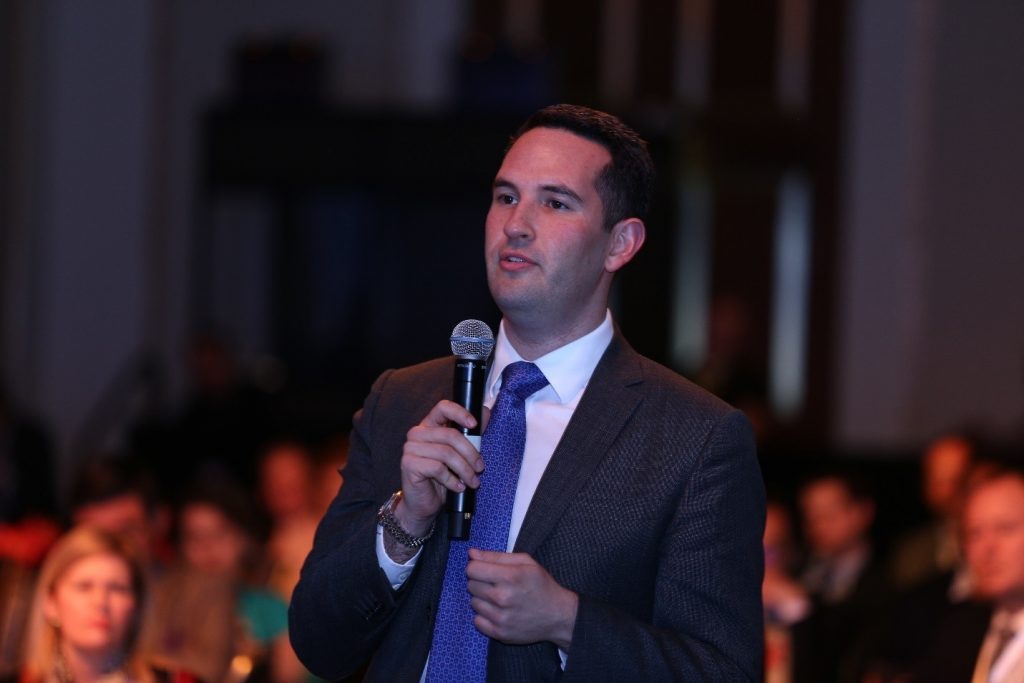
Fuel, given its vitality to life, can be a target of theft even over a margin of pennies in areas where the rule of law has broken down. Small thefts do in fact take a toll on the global economy, as hydrocarbon theft is the second largest form of global criminal activity. Panelists suggested that as various actors considered solutions to this issue, they must account for regional nuances.
GROWTH AND INVESTMENT PROSPECTS IN A POST-OIL WORLD
Introduced and moderated by: Dr. Christof Rühl, Global Head of Research, Abu Dhabi Investment Authority
Participants:
Dr. Mattia Romani, Managing Director, Economics, Policy, and Governance, European Bank for Reconstruction and Development
Dr. Jean-François Seznec, Nonresident Senior Fellow, Global Energy Center, Atlantic Council
THE NEW AFRICA: STRATEGIC OPPORTUNITIES IN SECURITY AND ENERGY
Introduced by: Gen. James L. Jones, President, Jones Group International; Chairman, Brent Scowcroft Center on International Security, Atlantic Council; former US National Security Advisor to President Barack Obama
Moderated by:
Dr. J. Peter Pham, Vice President for Research and Regional Initiatives and Director of the Africa Center, Atlantic Council
The Hon. Karim Keita, Chairman, Commission on National Defense, Security, and Civil Protection, National Assembly of the Republic of Mali
Tewodros Ashenafi, Founder, Chairman, and CEO, SouthWest Holdings
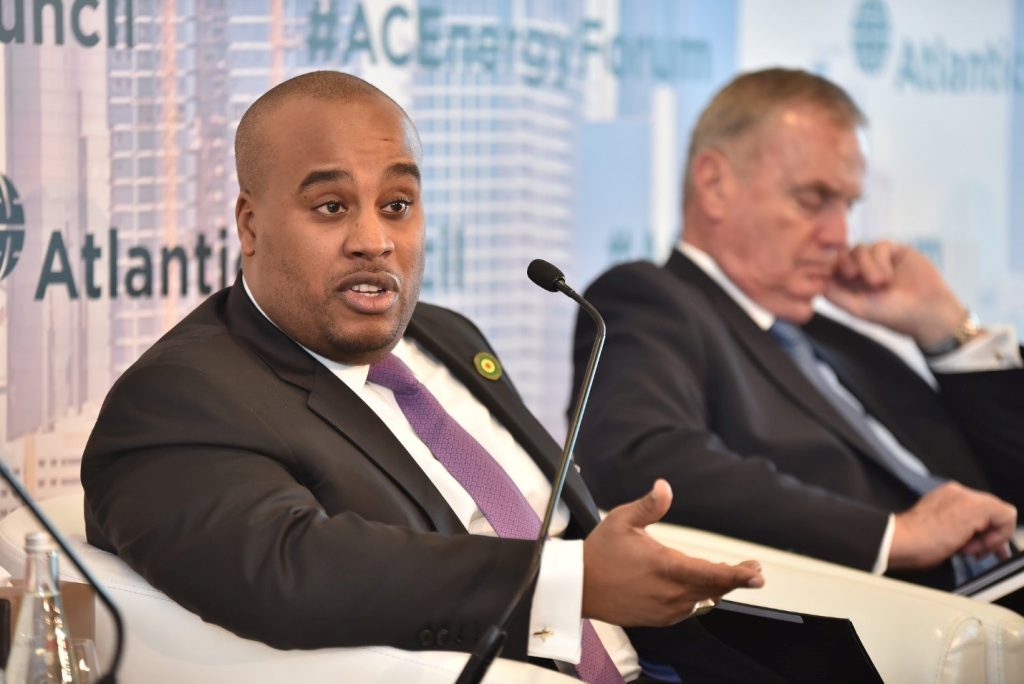
Despite challenges, Africa has vast potential, particularly in its energy sector. Given Africa’s susceptibility to climate change, panelists called for greater investment in the continent’s renewables to both meet environmental goals and also bolster employment in the sustainability industry.
THE ENERGY-WATER NEXUS
Moderated by: Khaldon Khashman, Secretary General, Arab Countries Water Utilities Association (ACWUA)
Dr. Rabia Ferroukhi, Head, Policy Unit and Deputy Director, Knowledge, Policy, and Finance, International Renewable Energy Agency
Dr. Matar Al Neyadi, Undersecretary, Ministry of Energy, United Arab Emirates; Chairman of the Board, Gulf Cooperation Council Interconnection Authority
N. Guy Winebrenner, Vice President, Energy and Environment, RTI International
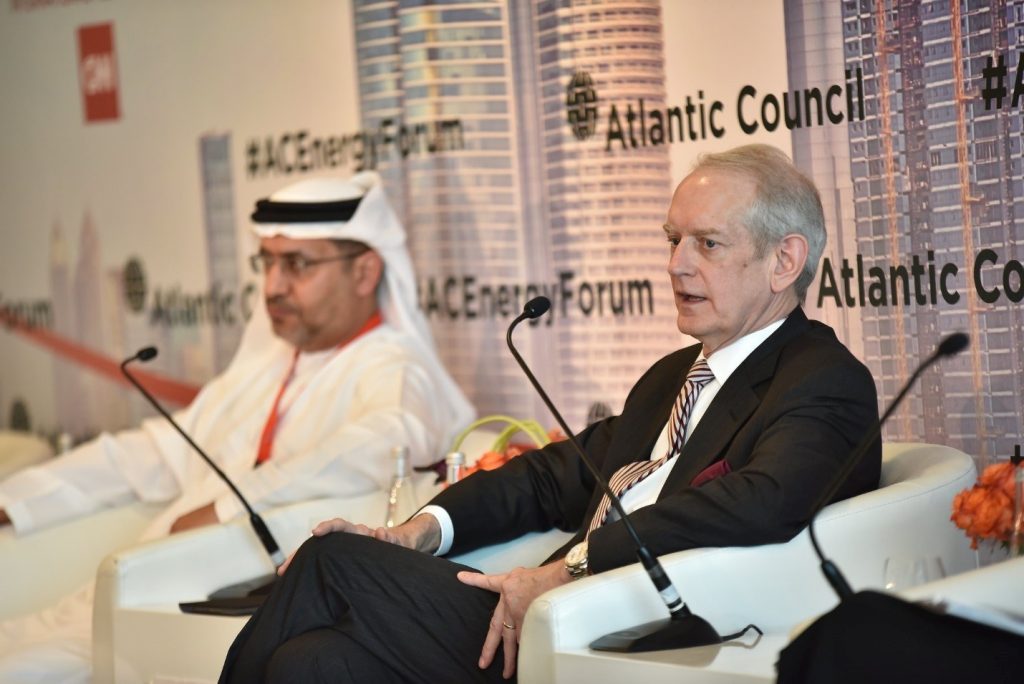
Khaldon Khashman started off the discussion with the disclaimer that water was the most threatened resource in the world today. For policymakers, a fine balance existed between water and energy, especially as both related to population growth. Panelists highlighted the importance of evaluating both producer and consumer needs when searching for more efficient ways to produce energy and supply water.
INNOVATIVE BUSINESS STRATEGIES IN THE ENERGY SECTOR
Moderated by: Randy Bell, Director, Business Strategies, Global Energy Center, Atlantic Council
Mohammed Ali Khan, Chief Commercial Officer – O&G Middle East North Africa & Turkey, GE Oil and Gas
Melanie Nakagawa, Deputy Assistant Secretary for Energy Transformation, US Department of State
Andrew Bowen, Visiting Scholar, American Enterprise Institute
Vitaly Butenko, Commercial Director, DTEK Energy
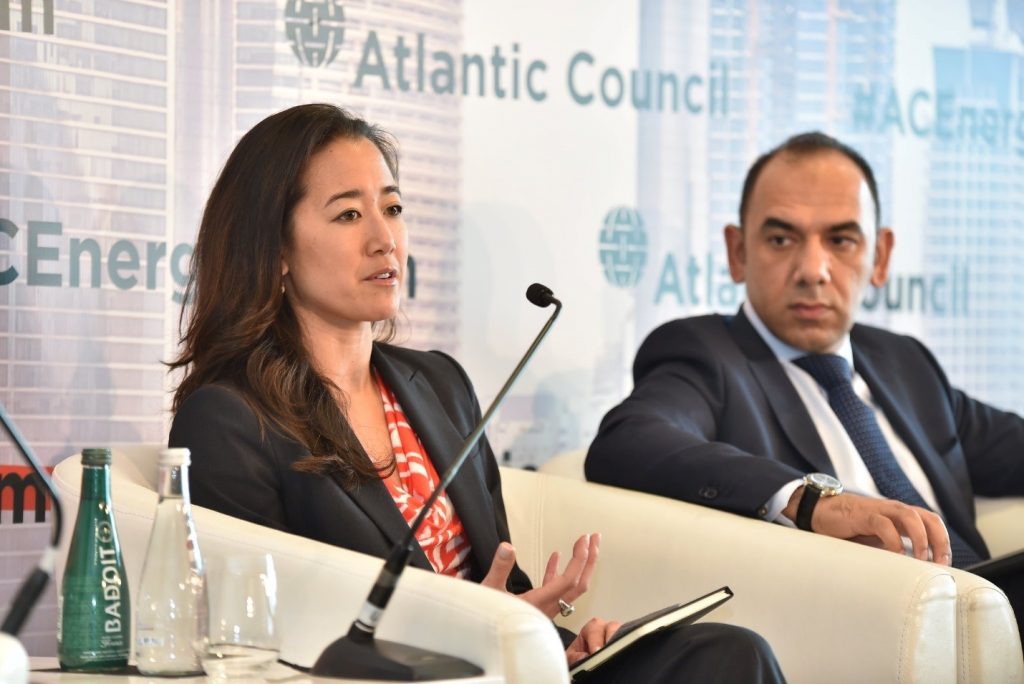
Renewable technologies are likely to play an increasingly significant role in any future global energy mix. Panelists discussed the necessity for businesses to continue adapting and investing in strategies that are successful in any policy environment, particularly in the energy sector.
PHYSICAL AND CYBER RISKS TO ENERGY INFRASTRUCTURE AND TRADE ROUTES
Introduction by: Karl V. Hopkins, Global Chief Security Officer and Partner, Dentons
Moderated by: Bud Coote, Resident Senior Fellow, Global Energy Center, Atlantic Council
Tom Feldhausen, Senior Vice President and Director, International Strategy, Federal Government Business Unit, Parsons
Michael Townshend, President, Middle East Operations, BP
Commander Jeremy Vaughan, Visiting Military Fellow, The Washington Institute for Near East Policy
[OFF-THE-RECORD]
POST-ELECTION US CLIMATE AND ENERGY POLICIES
Moderated by: Maya Raydan, Business Presenter, Sky News Arabia
Framing Remarks by: Todd Stern, Visiting Lecturer, Law, Yale Law School; former Special Envoy for Climate Change, US Department of State
H.E. Mohammad Sanusi Barkindo, Secretary General, Organization of the Petroleum Exporting Countries
Dominique Ristori, Director General, DG Energy, European Commission
Amb. Paula Dobriansky, Senior Fellow, The Future of Diplomacy Project, John F. Kennedy Belfer Center for Science and International Affairs, Harvard University
David Goldwyn, Chairman, Global Energy Center Advisory Group, Atlantic Council
Amb. Carlos Pascual, Senior Vice President, IHS Global Energy, International Affairs, IHS Markit
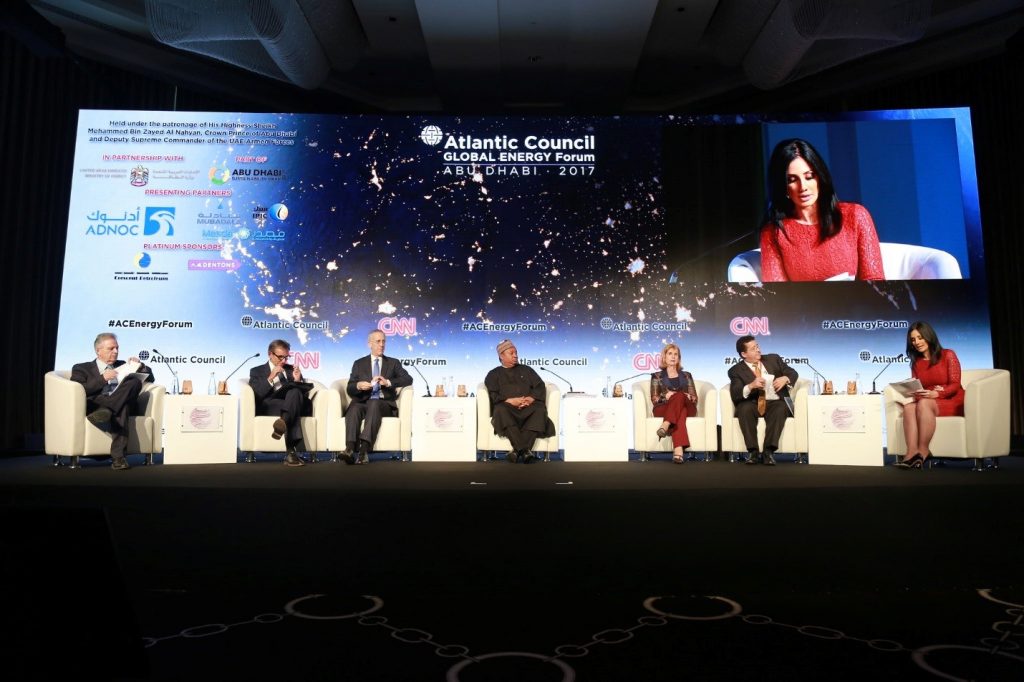
Since the US elections, many questions have emerged surrounding foreign policy and trade and the Paris Agreement in particular. As world leaders and populations alike struggle to understand the US’s new role in the world, it is imperative for the US to leverage capital in the private sector for research and development drive technological innovation in the energy industry. Panelists agreed that such action would be crucial to reaffirm commitment to the clean energy transition.
BREAKTHROUGH ENERGY TECHNOLOGIES: DISRUPTIVE MARKET AND GEOPOLITICAL IMPACTS
Moderated by: Karel Beckman, Editor-in-Chief, Energy Post
Keynote remarks by:
Rainer Baake, State Secretary, Federal Ministry for Economic Affairs and Energy, Federal Republic of Germany
Dr. Fatih Birol, Executive Director, International Energy Agency
Dr. Robert Armstrong, Director, Massachusetts Institute of Technology Energy Initiative
Ed Holland, Executive Vice President, Southern Company; Chief Executive Officer, Mississippi Power Co
Gardiner Hill, Director, Carbon Solutions, BP
Andreas Spiess, CEO, SolarKiosk
Dr. Carole Nakhle, Director, Crystol Energy; Nonresident Scholar, Carnegie Middle East Center
CLOSING REMARKS
Frederick Kempe, President and CEO, Atlantic Council
Frederick Kempe concluded the Global Energy Forum by reiterating the three main drivers that facilitate the energy transition in an increasingly interconnected world: policies, technology and markets. He emphasized the particular importance of technology in changing geopolitical and energy landscapes and the crucial role of tech innovation in achieving the commitments outlined in the Paris Agreement.
Subscribe to our newsletter
Sign up to receive our weekly DirectCurrent newsletter to stay up to date on the program’s work.
Follow us on social media